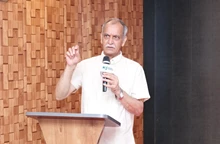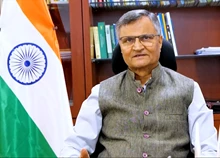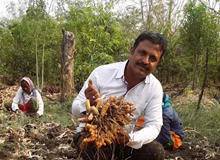
With the world experiencing record temperatures and driest conditions ever, as well as ongoing concerns about food security, wildlife habitats, and biodiversity, having a healthy soil system is more important and difficult than ever. But what exactly is "soil health," and how should it be measured?
According to new research from Cranfield and Nottingham Universities, how we think about, measure, and study soil must change in order to gain a better understanding of how to effectively manage this resource, with academics proposing an entirely new approach for assessing soil health. The European Journal of Soil Science released the study titled "A new theory for soil health."
Findings of Research:
Although ‘soil health' as a term is quite widely used now, it is problematic because it means different things to different people, and there is no single agreed way to measure the overall health of this system," says Jim Harris, Professor of Environmental Technology at Cranfield University.
"We want to start a conversation about how we can move to a holistic picture of soil health assessment by looking at the interconnected elements of this universally important system through this research. Taking a broader view of soil health could make a significant difference in addressing some of our most pressing issues, not least the climate crisis."
The researchers contend that current methods do not accurately reflect the broader system perspective required to fully assess a soil's condition and its health over time. Current methods measure individual soil properties and use these to try and assign a single number giving an overall soil health score.
Co-author of the study and 75th Anniversary Research Fellow at Cranfield University, Dr. Dan Evans, said: "We shouldn't rely on a single score for soil health, just as we shouldn't have a single measure or score for human health since it can't reflect the complexity of the entire body. We can fully grasp the direction of travel- is soil becoming better or worse? if we take into account a variety of metrics to look at the entire system."
The researchers suggest a whole system method for evaluating soil health that is based on a new hierarchical framework that incorporates the following metrics:
-
Characterizing the creatures that live in soil using signs of life
-
Indicators of Function: How much soils process materials
-
The degree to which soil components are interconnected and dependent is a sign of complexity.
-
The degree to which soils respond and recover to various stresses is known as the ‘signs of emergence.’
"This novel technique can be used to all soils and gets us closer to an interdisciplinary knowledge of the 'whole picture' of the soil system, rather than independently studying the component parts of the jigsaw," commented Sacha Mooney, Professor in Soil Physics at the University of Nottingham.
Professor Harris went on to say "It is difficult to overstate how crucial having a healthy soil system is since it protects biodiversity and wildlife, lowers flood risks, stores carbon, and ensures our food security. Moving toward this new assessment methodology will assist governments and land users in managing our world's soil resources sustainably for future generations."
(Source: Cranfield University)











